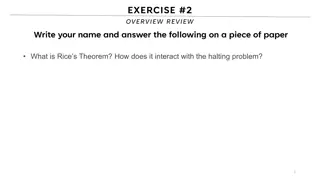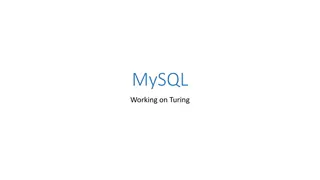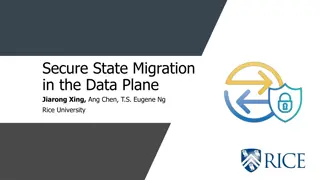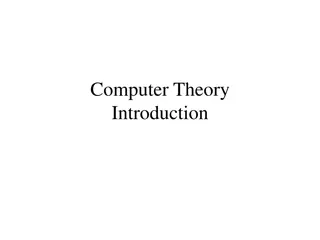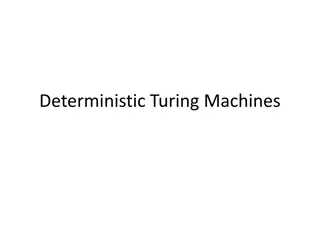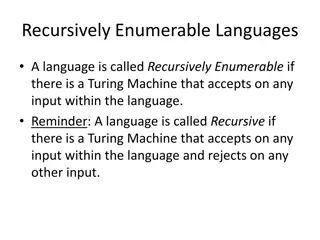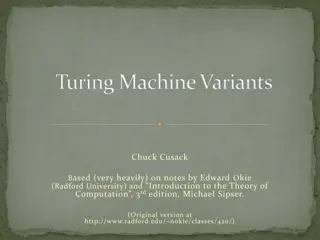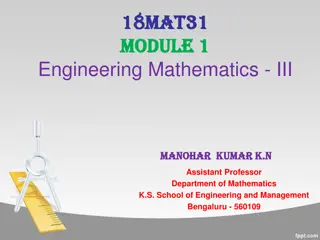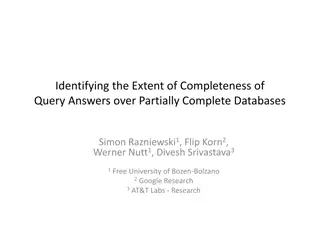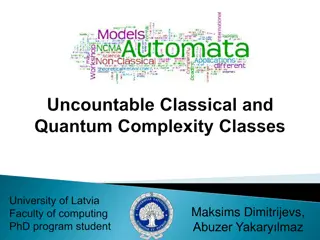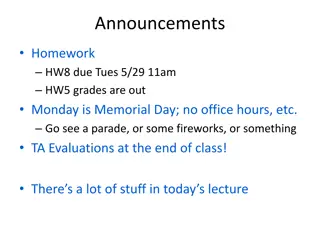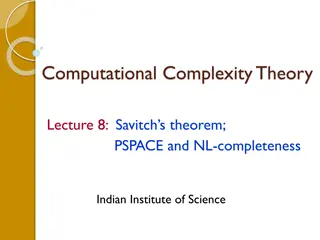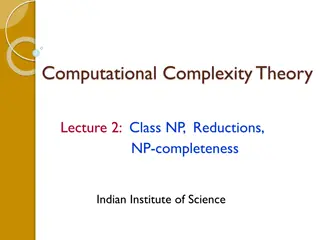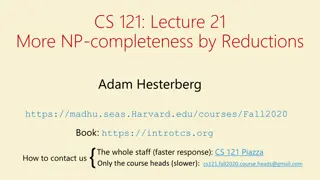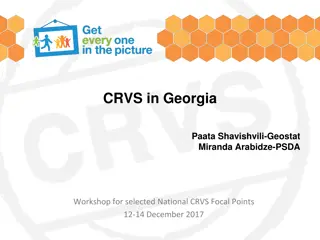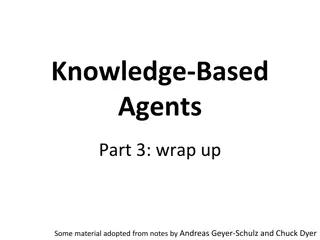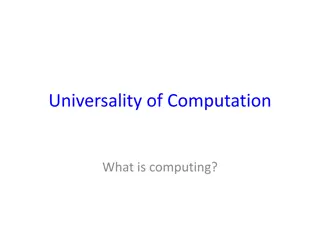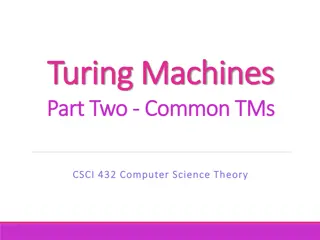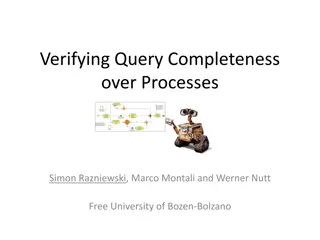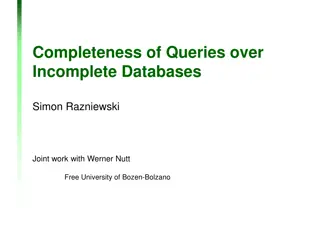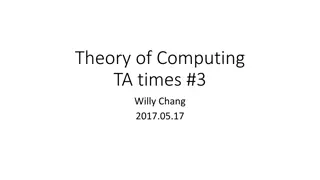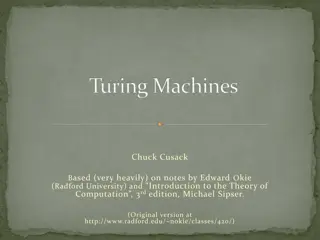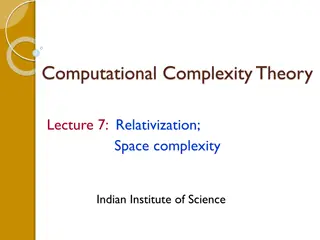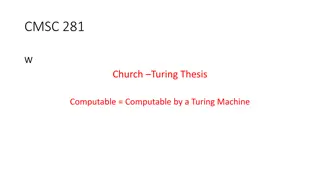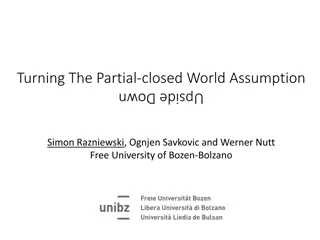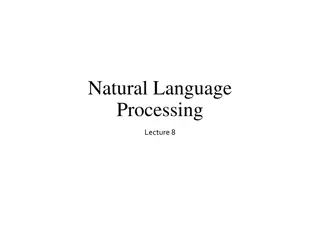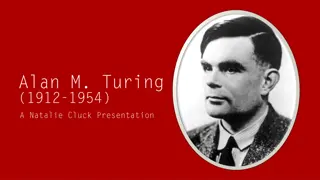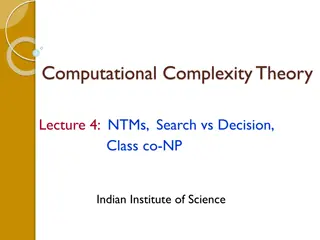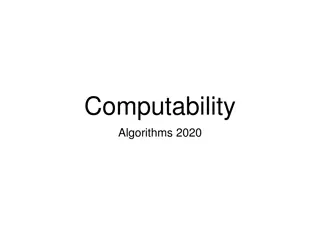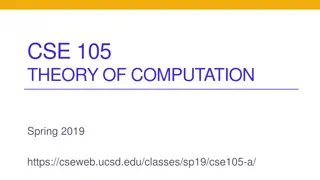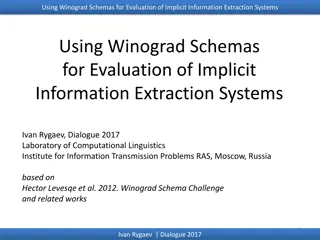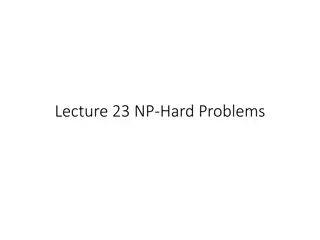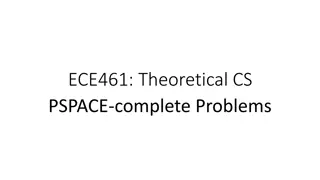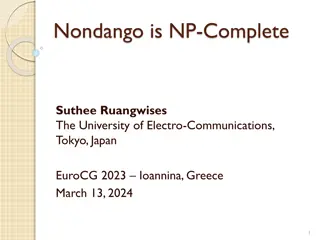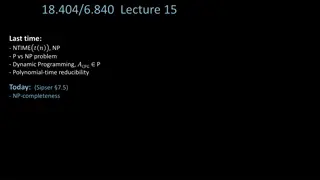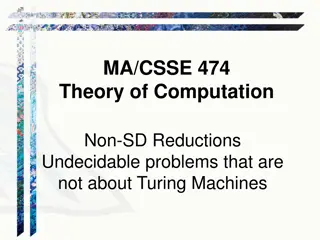Computability: Exploring Theoretical Limits of Computation
Delve into computability theory, focusing on what is computable and the limits of computation. Explore concepts like Rice's Theorem, the Halting Problem, and classes of expressiveness in computability theory, such as combinational logic, finite-state machines, pushdown automata, and Turing machines.
5 views • 43 slides
Guide to MySQL Operations on Turing Server
This guide provides step-by-step instructions on working with MySQL on Turing server at turing.csce.uark.edu. It includes logging in via SSH, connecting to the server, changing MySQL passwords, and performing operations on tables. Learn how to create tables, change passwords, and more with detailed
2 views • 21 slides
Evolution of Mathematical Theories and Proof Systems
Development of mathematical theories such as model theory, proof theory, set theory, recursion theory, and computational complexity is discussed, starting from historical perspectives with Dedekind and Peano to Godel's theorems, recursion theory's golden age in the 1930s, and advancements in proof t
1 views • 29 slides
Secure State Migration in the Data Plane Overview
The data plane synchronization protocol for secure state migration addresses the challenges of untrusted networks, ensuring completeness, low overhead, and integrity guarantee. P4Sync offers a solution by running in the data plane with minimal local control plane involvement, ensuring completeness,
2 views • 21 slides
Understanding Computer Theory: From Automata to Turing Machines
Dive into the world of computer theory, exploring concepts like automata, formal languages, and Turing machines. Learn about pioneers like Alan Turing and the fundamental questions in computer science, from computability to complexity.
1 views • 44 slides
LGBTQ Rights and Activism: A Historical Perspective
Alan Turing's contributions to computer science, his tragic experience as a homosexual in the 20th century, definitions of sexual orientation and gender identities, and the timeline of LGBTQ rights and setbacks in the US are discussed. The narrative highlights the struggles and progress made in advo
0 views • 16 slides
Understanding Deterministic Turing Machines
Detailed explanation of Deterministic Turing Machines, their constituents, formal definition, determinism, and special statuses such as Start, Accept, Reject, and Loop. Includes visual representations and key concepts of deterministic Turing machines.
0 views • 14 slides
Understanding Recursive vs Recursively Enumerable Languages
Comparison between recursive and recursively enumerable languages in terms of Turing Machines acceptance, decidable languages, recognizable languages, and partial predicates. Explains the concepts with examples and how Turing Machines decide membership in languages.
0 views • 8 slides
Turing Machine Variants and Equivalence Theorems Summary
Explore different variants of Turing machines, such as stay-put TMs and multi-tape TMs, along with key results like the equivalence theorems. Understand the idea behind simulating multi-tape TMs with single-tape TMs and how different models are related. Dive into the proofs and implications of these
0 views • 14 slides
Understanding Artificial Intelligence and Intelligence in Computers
Artificial Intelligence (AI) aims to create intelligent computer systems that mimic human behaviors. It involves algorithms derived from human intelligence to make computers smarter and more useful. This includes the ability to acquire knowledge, think, reason, and exhibit goal-oriented behavior. Th
0 views • 13 slides
Exploring Engineering Mathematics and Automata Theory Concepts
Delve into topics such as automata theory, Turing machines, and mathematical approaches for addition using unary numbers. Discover state transition diagrams and gain insights into the workings of Turing machines in computer science.
0 views • 23 slides
Identifying Completeness of Query Answers in Incomplete Databases
The study delves into how to assess the completeness of query answers when dealing with partially complete databases. By analyzing data from a telecommunication company’s data warehouse, the query results are examined to determine if all warnings generated by maintenance objects with hardware team
0 views • 23 slides
Theoretical Studies on Recognizing Languages
Various models such as Deterministic Turing Machines, Probabilistic Models, and Quantum Classes are explored for recognizing languages, with discussions on regular, nonregular, and uncountable languages. Theoretical concepts like bounded-error recognition, computational complexities, and enumeration
0 views • 28 slides
Sizes of Infinite Sets: Insights into Countably Infinite Concepts
Explore the fascinating world of countably infinite sets through informative images and explanations from a CSE 105 lecture on the Theory of Computability. Delve into the concepts of natural numbers, strings, Turing machines, languages, and the intriguing implications of the Pigeonhole Principle. Di
0 views • 26 slides
Understanding Combinators and Computability: Unveiling the Foundations
Delve into the realm of combinatorial logic and computability through the lens of SKI combinators, exploring their Turing completeness and connection to algorithmic decision-making. Discover the historical significance of Hilbert's program, Godel's incompleteness proofs, the Church-Turing thesis, la
0 views • 65 slides
Overview of Computational Complexity Theory: Savitch's Theorem, PSPACE, and NL-Completeness
This lecture delves into Savitch's theorem, the complexity classes PSPACE and NL, and their completeness. It explores the relationship between time and space complexity, configuration graphs of Turing machines, and how non-deterministic space relates to deterministic time. The concept of configurati
0 views • 67 slides
Introduction to NP-Completeness and Complexity Theory
Explore the concepts of NP-completeness, reductions, and the complexity classes P and NP in computational complexity theory. Learn about decision problems, Boolean functions, languages, polynomial-time Turing machines, and examples of problems in class P. Understand how to deal with functional probl
0 views • 56 slides
Understanding NP-Completeness and Reductions in Computer Science
Dive into the concept of NP-completeness and reductions in computer science, exploring topics such as 3SAT, E3SAT, EU3SAT, 1-in-EU3SAT, and SUBSETSUM. Learn about weak and strong NP-hardness, witness concepts, and the review of past lectures touching on NP, problems easy to verify, and more.
0 views • 27 slides
Vital Statistics and Civil Registration System in Georgia: Overview and Implementation
The Civil Registration and Vital Statistics (CRVS) system in Georgia is managed by various institutions like the Public Service Development Agency and the National Center for Disease Control. The system includes registration of vital events, quality checks of causes of death, and production of vital
0 views • 13 slides
Understanding Knowledge-Based Agents: Inference, Soundness, and Completeness
Inference, soundness, and completeness are crucial concepts in knowledge-based agents. First-order logic allows for expressive statements and has sound and complete inference procedures. Soundness ensures derived sentences are true, while completeness guarantees all entailed sentences are derived. A
0 views • 6 slides
Overview of Universality and Church-Turing Hypothesis
The universality of computation encompasses physical and mathematically defined computation, along with the concept of Turing machines and universal computers. The Church-Turing Hypothesis posits that everything computable can be computed by a Turing machine. The modern interpretation extends this t
0 views • 27 slides
Understanding Turing Machines and Busy Beaver Problem in Computer Science Theory
Delve into the realm of Turing machines, the Busy Beaver problem, palindromes, and incrementing algorithms. Explore the configurations of a Turing machine tape, the maximum number of 1s a machine can print and still halt, algorithms to determine palindromes, and tape setup for incrementing.
0 views • 10 slides
Verifying Query Completeness over Processes in School Management Systems
Process execution in school management systems often lacks formalization, leading to delays and incomplete database content. This study explores the challenge of verifying query completeness by examining the interaction between the information system and the real world, using a case study of enrolme
0 views • 25 slides
Study on Completeness of Queries over Incomplete Databases
Investigation into query completeness over incomplete databases, highlighting the importance of data completeness for accurate query answering. Examples and reasoning provided to illustrate the challenges and considerations in ensuring query completeness.
0 views • 31 slides
Theory of Computing TA Times #3 - Willy Chang
Explore insights on proof by construction, PDA handling, unambiguous grammar, Turing machines, and more in this TA session. Learn how to provide steady examples for proofs, avoid ambiguous grammar structures, and understand the equivalence of Turing machines with reset options.
0 views • 13 slides
Overview of Turing Machines: Introduction, Tape, and Computation
Turing Machines are fundamental in the theory of computation, capable of recognizing all computable languages. They consist of a Finite State Machine combined with an infinite tape. The tape is initialized with input on the left end, and a TM's computation can either halt by entering special accept
0 views • 29 slides
Oracle Turing Machines in Computational Complexity Theory
The lecture delves into the concept of Oracle Turing Machines and their role in proving computational complexity results, such as the limitations of diagonalization in demonstrating P vs. NP. Oracle Turing Machines are defined as Turing Machines with access to a special query tape and states for ora
0 views • 59 slides
Understanding Church-Turing Thesis and Computability with Turing Machines
The Church-Turing Thesis states that every computable function can be computed by a Turing Machine. This concept, pioneered by Turing, revolutionized the way we understand computability and algorithms. By breaking down the process into primitive operations, we can express complex algorithms in an un
0 views • 21 slides
Modeling Complete and Incomplete Data in Database Systems
The discussion revolves around the partial-closed world assumption, contrasting incompleteness as default (IAD) with completeness as default (CAD). It delves into querying completeness reasoning, translating between CAD and IAD, and the implications of using IAD over CAD in database modeling. Variou
0 views • 13 slides
Understanding Advanced Smoothing Algorithms in Natural Language Processing
Dive into the world of advanced smoothing algorithms like Good-Turing, Kneser-Ney, and Witten-Bell used in Natural Language Processing. Explore concepts such as Good-Turing Smoothing Intuition, Unigram Prior Smoothing, and more general formulations for better language modeling through statistical te
0 views • 21 slides
Alan Turing: Mathematician, Cryptanalyst, and Computer Science Pioneer
Alan Turing, an English mathematician, cryptanalyst, logician, philosopher, and pioneer in computer science, played a crucial role in deciphering German Enigma encrypted messages during World War II. He is known for his work on the Turing machine, considered the foundation of theoretical computer sc
0 views • 6 slides
Understanding Cook-Levin Theorem in NP-Completeness
The Cook-Levin theorem establishes the NP-completeness of the SAT language by showing how every problem in NP can be reduced to SAT. It demonstrates that computation is a local process where each step only affects a constant number of bits. Through this, a polynomial time computable function can be
0 views • 84 slides
Exploring Hilbert's Program and Turing Machines in Mathematics
Delve into Hilbert's Program and its impact on the understanding of mathematical truth, from attempts to resolve paradoxes to the concept of formalization of effective procedures. Understand the significance of Godel's incompleteness result in the context of algorithmic decision-making. Explore the
0 views • 40 slides
Exploring Theory of Computation: Undecidability and Counting Arguments
Dive into the world of theory of computation with a focus on undecidability, counting arguments, and examples of non-Turing recognizable languages. Discover the intricacies of proving problems as undecidable and delve into the concepts of Turing-recognizable sets and deciders for complex computation
0 views • 22 slides
Evaluation of Implicit Information Extraction Using Winograd Schemas
Winograd Schemas are utilized for evaluating implicit information extraction systems. Ivan Rygaev discusses the challenges and significance of this method compared to the Turing Test, emphasizing the need for world knowledge for successful interpretation. The schemas propose unique anaphora resoluti
0 views • 18 slides
Understanding NP-Hard Problems and NP-Completeness
Delve into the complexities of NP-hard problems, NP-complete problems, and the relationships between NP, NP-hard, and NP-complete classes. Learn about easy-to-verify problems in NP, the concept of NP-completeness, the first NP-complete problem - Gates Circuits, and the NP-complete problem CIRCUIT-SA
0 views • 15 slides
Understanding PSPACE-Complete Problems in Complexity Theory
This content delves into complexity theory, exploring PSPACE-complete problems and their relevance within the realm of theoretical computer science. It covers concepts such as time complexity classes, P vs. NP dilemma, NP-complete languages, space complexity, PSPACE vs. NPSPACE, and PSPACE completen
1 views • 19 slides
Exploring NP-Completeness Proofs in Pencil Puzzles: The Case of Nondango
Delve into the realm of NP-Completeness proofs within pencil puzzles through the intriguing case of Nondango. Unravel the challenge of coloring circles in a rectangular grid to meet specific criteria, showcasing the complexity and depth of this puzzle type.
0 views • 40 slides
Understanding NP-Completeness: Cook-Levin Theorem and Clique Problem
Today's lecture delved into NP-completeness, focusing on the Cook-Levin Theorem and the Clique Problem. NP-completeness is defined as a language that is in NP and all other languages in NP are polynomial-time reducible to it. The Cook-Levin Theorem states that SAT, a Boolean satisfiability problem,
0 views • 10 slides
Undecidable Problems in Theory of Computation
Explore the concept of undecidable problems in the theory of computation, focusing on non-SD reductions and undecidable problems not involving Turing Machines. Learn about proving languages are not SD, using examples like AanBn and creating reductions to show non-SD properties. Work through reductio
0 views • 31 slides
